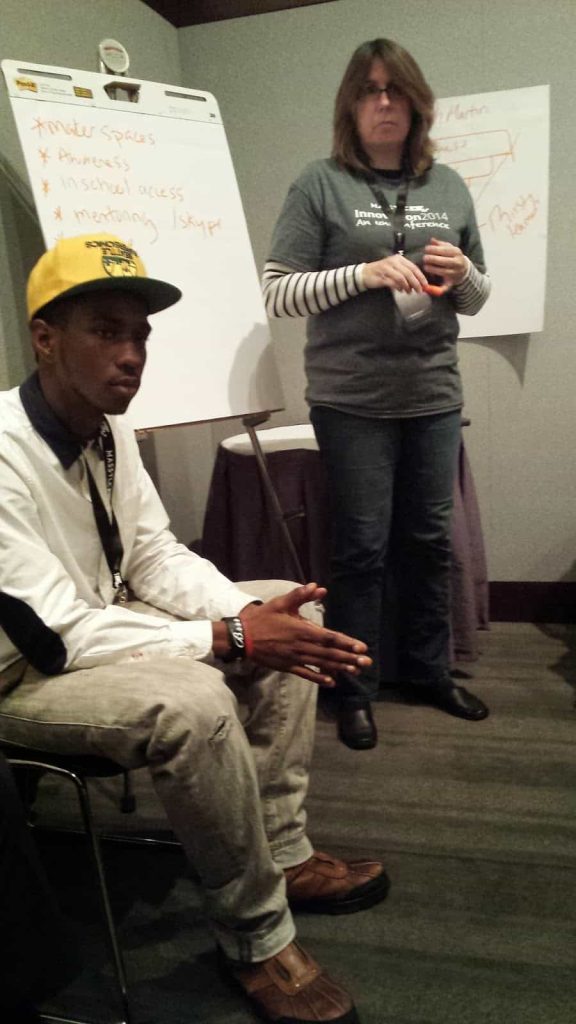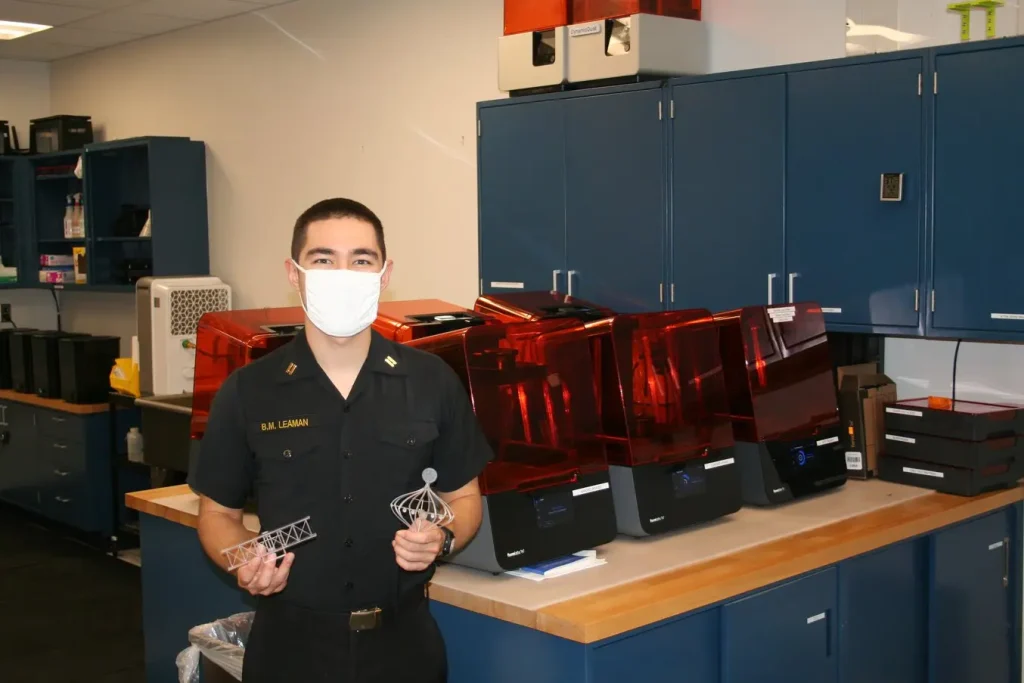Post by Adam Zand, principal
at Almost Ubiquitous
at Almost Ubiquitous
This important session
was led by Micah Martin, an 18 year-old Boston resident who codes and is
active with Resilient
Coders, a program focused on making web
technology more available to kids who might not otherwise be exposed to it. He
was joined by Tyler Mitchell and Fredy Meto, peers at Resilient
Coders. Heather Carey, executive director of Mass TLC’s Education Foundation joined the session and there was active participation from
the large audience.
was led by Micah Martin, an 18 year-old Boston resident who codes and is
active with Resilient
Coders, a program focused on making web
technology more available to kids who might not otherwise be exposed to it. He
was joined by Tyler Mitchell and Fredy Meto, peers at Resilient
Coders. Heather Carey, executive director of Mass TLC’s Education Foundation joined the session and there was active participation from
the large audience.
The Need – A Personal
Story
Story
Micah set the stage with
issues faced and the need for access and positive social change.
issues faced and the need for access and positive social change.
“Many people start using
computers and coding as self-taught and then curiosity takes over. In my
environment, the distractions take over and there are too many other
temptations or even stigmas about education. We are being left in the dark too
much. The inner city itself makes learning hard. Finding out about coding is
hard. There are no formal classes in schools.”
computers and coding as self-taught and then curiosity takes over. In my
environment, the distractions take over and there are too many other
temptations or even stigmas about education. We are being left in the dark too
much. The inner city itself makes learning hard. Finding out about coding is
hard. There are no formal classes in schools.”
His story is compelling
and instructive as we look at helping kids break out from institutional and
self-imposed boundaries, “At 15, I was in and out of foster homes, DYS. I tried
to remain humble, but knew I was intelligent. Never used it. I didn’t see how
that would make me money. I was tired of institutions. Change happened, when I
changed how I looked at myself and the paradigm.”
and instructive as we look at helping kids break out from institutional and
self-imposed boundaries, “At 15, I was in and out of foster homes, DYS. I tried
to remain humble, but knew I was intelligent. Never used it. I didn’t see how
that would make me money. I was tired of institutions. Change happened, when I
changed how I looked at myself and the paradigm.”
Heather Carey shared a
higher level look at tenets to guide us: Awareness, Exposure, Educate, Master,
Thirsty learners. She talked about the importance of reaching kids beyond the
sons and daughters of techies. She asked what can we do better as a tech
community to reach a larger amount of students in urban areas?
higher level look at tenets to guide us: Awareness, Exposure, Educate, Master,
Thirsty learners. She talked about the importance of reaching kids beyond the
sons and daughters of techies. She asked what can we do better as a tech
community to reach a larger amount of students in urban areas?
Resources and Reaching
Out
Out
We started looking at
groups and institutions. Chris Swenor from VSnap shared an economic
benefit of working with inner city coders. He thought it would it be cheaper to
have an inner city agency to improve. Less need to outsource. He wants to hire
and work with passionate, skilled people.
groups and institutions. Chris Swenor from VSnap shared an economic
benefit of working with inner city coders. He thought it would it be cheaper to
have an inner city agency to improve. Less need to outsource. He wants to hire
and work with passionate, skilled people.
Heather mentioned South End Technology Center as resource. Resilient Coders is connecting to other
nonprofits, but it’s hard to get a plan down and coordinate. There is not
really a place to work together. This isn’t systematic or organized. She is
working to increase connections and collaboration through her work at the
Education Foundation and mentioned monthly meet-ups they have started to host.
nonprofits, but it’s hard to get a plan down and coordinate. There is not
really a place to work together. This isn’t systematic or organized. She is
working to increase connections and collaboration through her work at the
Education Foundation and mentioned monthly meet-ups they have started to host.
Heather asked Micah, how
do we reach your friends?
do we reach your friends?
Micah shared, “the main
issue is development and maturity. We are told to have a negative self image –
change the paradigm of an inner city kid who wants to improve and get
opportunity. My friends are genuine and would get motivated by personal
satisfaction and success. Overcoming something hard like coding helps you learn
and grow. There’s a lot of failure in coding.”
issue is development and maturity. We are told to have a negative self image –
change the paradigm of an inner city kid who wants to improve and get
opportunity. My friends are genuine and would get motivated by personal
satisfaction and success. Overcoming something hard like coding helps you learn
and grow. There’s a lot of failure in coding.”
Dan Bricklin, trustee at MassTLC added: “Failure is
important. Success happens when you make something work. The coming together
and the process of next steps is positive. Feedback from peers and the little
steps will keep us going. Better to look at that before thinking about success
in the app store. The steps along the way of coding is a type of life. How do
you get that part – a drug so to speak – accepted as fun and build passion that
gets people hired.”
important. Success happens when you make something work. The coming together
and the process of next steps is positive. Feedback from peers and the little
steps will keep us going. Better to look at that before thinking about success
in the app store. The steps along the way of coding is a type of life. How do
you get that part – a drug so to speak – accepted as fun and build passion that
gets people hired.”
Another participant
shared that interaction with the physical world interests people. Having a
maker space would help and robots in the schools to work with as ongoing
activities.
shared that interaction with the physical world interests people. Having a
maker space would help and robots in the schools to work with as ongoing
activities.
We started a list of
elements that could help:
elements that could help:
- Maker space
- Awareness
- In school access
- After-school access
- Resources (books, classes)
- Mentors, volunteers from companies
- Retreats, safe spaces
- Site visits to companies
- Internships for high school students at tech companies
The audience asked Micha
if places like the South End Technology Center and lab at Madison Park HS are
helpful to people?
if places like the South End Technology Center and lab at Madison Park HS are
helpful to people?
Micha said maker centers
and labs are interesting. However, every neighborhood and actual street has
gang issues, history and potential conflict. A maker space or community center
could turn sour.
and labs are interesting. However, every neighborhood and actual street has
gang issues, history and potential conflict. A maker space or community center
could turn sour.
Heather talked about
work with schools being tough and the need for money and resources.
work with schools being tough and the need for money and resources.
Micha shared, “In 9th
grade, I was at Boston Latin. I learned so much quickly and was given O’Reilly
coding books. I was expelled early. When I went back to normal school, I didn’t
have any access to books or a facility.”
grade, I was at Boston Latin. I learned so much quickly and was given O’Reilly
coding books. I was expelled early. When I went back to normal school, I didn’t
have any access to books or a facility.”
Heather mentioned CoderDojo, an online open source curriculum for kids. A Nokia
employee is doing it in Somerville. After-school is a possibility and company
involvement as a shared effort.
employee is doing it in Somerville. After-school is a possibility and company
involvement as a shared effort.
Dan Bricklin wondered if
there was a virtual solution to access to knowledge and resources. Dan lives on
Skype screen sharing. He asked if we should we provide mentors on Skype? People
available to answer questions. “We have tons of O’Reilly books that we no
longer need and could gift. How does one do the mentoring and connecting on
Skype – how would you figure out who would be a good fit?”
there was a virtual solution to access to knowledge and resources. Dan lives on
Skype screen sharing. He asked if we should we provide mentors on Skype? People
available to answer questions. “We have tons of O’Reilly books that we no
longer need and could gift. How does one do the mentoring and connecting on
Skype – how would you figure out who would be a good fit?”
Micah liked the idea,
but need to have the kids realize that this is possible, ignite the passion. “I
had it with game programming around 13 and 14. There is a technology gap in
inner city. If you have Facebook and YouTube, many will think that is enough.”
Micah shares his smart phone for access. Micha sees the potential and education
of Internet. He stopped going to school at 16, but taught himself and got to go
to college. “Coding can be cool in my peer group. My friends really like the
idea of me doing it and making money.”
but need to have the kids realize that this is possible, ignite the passion. “I
had it with game programming around 13 and 14. There is a technology gap in
inner city. If you have Facebook and YouTube, many will think that is enough.”
Micah shares his smart phone for access. Micha sees the potential and education
of Internet. He stopped going to school at 16, but taught himself and got to go
to college. “Coding can be cool in my peer group. My friends really like the
idea of me doing it and making money.”
Micah shared that an
off-site retreat would be cool, but that gangs will still be an issue. People
need to change how they look at themselves. Eventually people grow out of it
and realize they were being manipulated or put into risk for no personal
benefit.
off-site retreat would be cool, but that gangs will still be an issue. People
need to change how they look at themselves. Eventually people grow out of it
and realize they were being manipulated or put into risk for no personal
benefit.
Fredy Meto, a peer at Resilient Coders shared that one of
the things that attracted him were large groups of different people being
involved – former DYS, gang members and prisoners. A problem with a Maker Space
is you might have 5-7 people trying to teach 500 people. Lack of quality. If
given the resources, he’d hire or involve as many mentors as could in order to
go to DYS, prisons to teach.
the things that attracted him were large groups of different people being
involved – former DYS, gang members and prisoners. A problem with a Maker Space
is you might have 5-7 people trying to teach 500 people. Lack of quality. If
given the resources, he’d hire or involve as many mentors as could in order to
go to DYS, prisons to teach.
Some companies do
mentoring and school visits as one day to help. Corporations need to be asked
and connected. However, it really needs to be an ongoing organized effort – not
just one offs.
mentoring and school visits as one day to help. Corporations need to be asked
and connected. However, it really needs to be an ongoing organized effort – not
just one offs.
Programming in Schools
and Pressure on Government
and Pressure on Government
Massachusetts State Senator Karen Spilka has filed legislation to help. She filed a coding in
schools bill. There is an economic development bill that contains $1M for
coding in school. Schools are being selected by MassCan (Massachusetts Computing Attainment Network). The Senator
wants to build on that effort and shared that it helped her understand the
issues by meeting with Resilient Coders.
schools bill. There is an economic development bill that contains $1M for
coding in school. Schools are being selected by MassCan (Massachusetts Computing Attainment Network). The Senator
wants to build on that effort and shared that it helped her understand the
issues by meeting with Resilient Coders.
She said, “The challenge
is – we will never be enough, but more voices will get this from pilot program
to curriculum. We need this as a country. In the short-term, people continue to
mentor, contact Council and similar organization, get out there, look at
overcoming the barriers as a pilot group. At same time, join forces and reach
out to State Senator Spilka’s office and MassTLC Education Foundation. More
voices mean it gets heard – stand out from the 8000 other bills that get filed
annually. This is important to business, community.”
is – we will never be enough, but more voices will get this from pilot program
to curriculum. We need this as a country. In the short-term, people continue to
mentor, contact Council and similar organization, get out there, look at
overcoming the barriers as a pilot group. At same time, join forces and reach
out to State Senator Spilka’s office and MassTLC Education Foundation. More
voices mean it gets heard – stand out from the 8000 other bills that get filed
annually. This is important to business, community.”
Heather said the
Education Foundation is recruiting CXO
signatures to show policy makers how
important they feel computer science education in our schools is for the future
of our kids.
Education Foundation is recruiting CXO
signatures to show policy makers how
important they feel computer science education in our schools is for the future
of our kids.
Galen Moore,
editor in chief at BostInno asked if coding is the best direction and use of
resources: “Should we look at digital marketing, SEO, digital strategy?” Dan
Bricklin answered, that “marketing is selling something. Coding is teaching
what needs are and solving problems. That moves into wider entrepreneurship and
life skills. Establish need and determine what will solve it.”
editor in chief at BostInno asked if coding is the best direction and use of
resources: “Should we look at digital marketing, SEO, digital strategy?” Dan
Bricklin answered, that “marketing is selling something. Coding is teaching
what needs are and solving problems. That moves into wider entrepreneurship and
life skills. Establish need and determine what will solve it.”
One idea was to adopt a
“Start-up Institute” model with benefits to companies. If you mentor, you get
access to potential employees. We can also have corporate coding or similar
business projects that can be tackled short-term in a school.
“Start-up Institute” model with benefits to companies. If you mentor, you get
access to potential employees. We can also have corporate coding or similar
business projects that can be tackled short-term in a school.
Next Steps
In our wrap up, Heather
asked if we should we all commit to doing something?
Micah asked us for the goals, and what an ideal program and collaboration would
look like. What are the roadblocks?
asked if we should we all commit to doing something?
Micah asked us for the goals, and what an ideal program and collaboration would
look like. What are the roadblocks?
There is a need for high
level social change, but it is critical to have support at the grassroots with
a combination of nonprofits, companies, educators and mentors.
level social change, but it is critical to have support at the grassroots with
a combination of nonprofits, companies, educators and mentors.
Senator Spilka said,
make sure Boston schools reach out to MassCan funding so they can be part
of next round. Heather can help make that connection.
make sure Boston schools reach out to MassCan funding so they can be part
of next round. Heather can help make that connection.
Can we get lots of these
people together? Tech companies opening up doors to high school students for
internships.
people together? Tech companies opening up doors to high school students for
internships.
Micah asked is there a
group that can connect these parties?
group that can connect these parties?
David Delmar, founder of
Resilient Coders and Heather are having meetings about this. Meet ups will be
open.
Resilient Coders and Heather are having meetings about this. Meet ups will be
open.
Sign up for MassTLC’s #RandomActsOfCode, December 8-12. Build the connections. Meet up and
continue these discussions. Get involved with Resilient
Coders and reach out to communities in
need.
continue these discussions. Get involved with Resilient
Coders and reach out to communities in
need.
Micah left us with the challenge: “Do
something.” People need to link together to bring coding to inner city youth.





